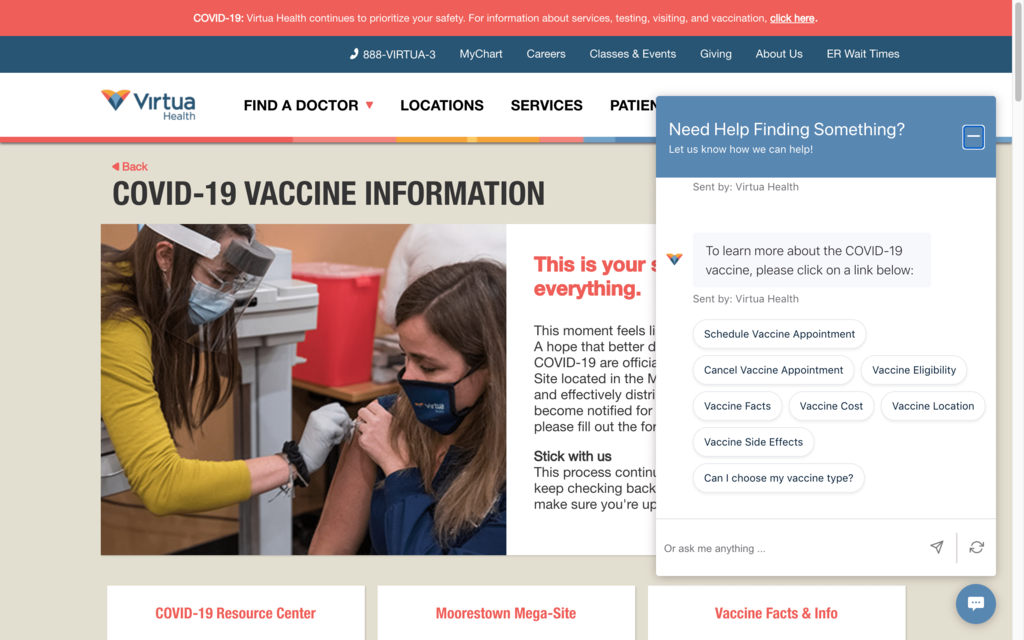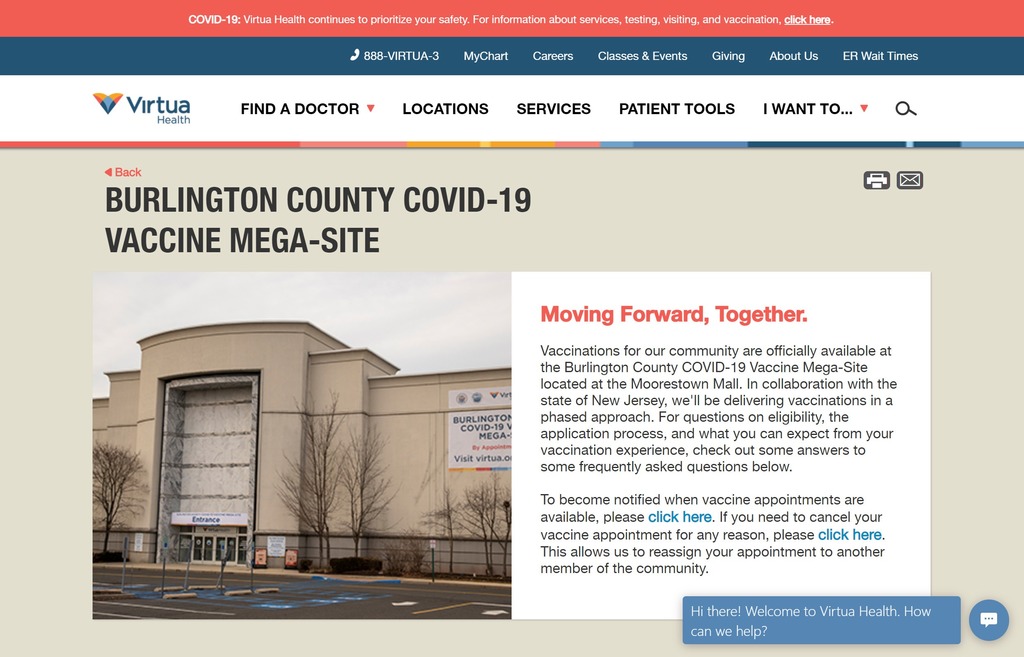When Your State Opens Vaccine Eligibility Floodgates, How Do You Keep Up with Demand?
// By Jane Weber Brubaker //
 On January 13, the headline on NJ.com read “Major expansion of New Jersey COVID vaccine eligibility starts tomorrow.” Overnight, 4.47 million New Jersey residents age 65 and older and those between 16 and 64 with certain medical conditions became eligible to receive a vaccination at one of the state’s 123 approved sites.
On January 13, the headline on NJ.com read “Major expansion of New Jersey COVID vaccine eligibility starts tomorrow.” Overnight, 4.47 million New Jersey residents age 65 and older and those between 16 and 64 with certain medical conditions became eligible to receive a vaccination at one of the state’s 123 approved sites.

Ryan Younger, vice president of marketing, Virtua Health
“New Jersey opened up the criteria to a huge number of people in the public,” says Ryan Younger, vice president of marketing at Virtua Health in southern New Jersey. “People were calling every which way — it was just a huge outpouring.” Virtua operates one of the state’s vaccine “mega-sites” in a former Lord & Taylor department store. “In the first week we had over 250,000 online form completions for appointments and scheduled more than 50,000 appointments, up to the capacity we had,” Younger says.

Angela Collins, assistant vice president, access and navigation, Virtua Health
Fortunately, Virtua had launched a chatbot solution from Loyal the month before. “Loyal has just been a game changer for us,” says Angela Collins, assistant vice president of access and navigation at Virtua, departments overseeing 2.5 million customer interactions a year.
Younger adds, “It just came in handy that we were able to stand that up before the crunch of the vaccine center, because then it was able to offload some of the demand. I mean, the demand was just unbelievable.”
The chatbot helped website visitors navigate their way to a scheduled vaccination appointment either via self-scheduling or with the help of a live agent.
Virtua’s orientation to the consumer is one of the strategic goals the organization has been working toward over the past few years, along with digital transformation. “A huge focus at Virtua is how we get closer to the consumer, how we listen, how we respond more proactively to consumer trends,” Younger says. The introduction of Loyal’s chatbot was part of that process, to make it easier for website visitors to access the information they’re looking for.

Brian Gresh, president, Loyal
The chatbot solution is what Brian Gresh, president of Loyal, calls a “global AI model,” meaning it aggregates learning across all organizations. “As conversations come in — we call those utterances — as people type into the chatbot, we capture those utterances. We’ve had millions of messages go through our platform,” says Gresh.
“We de-identify all of those conversations, but we use those questions to train our global AI model. The model then understands what’s a billing question. What’s an access question. What’s a scheduling question. What’s a COVID question. And those learnings apply to all of our clients.”
That the chatbot came preprogrammed with a robust, healthcare-specific “intent library” made it immediately useful to Virtua. “There was certainly a lot of information that was baked in, and then we customized it for Virtua,” says Younger. “I think 98 percent of the questions were recognized and could be answered right from the start. It was an exciting baseline to have.”
This was a big improvement in performance over Virtua’s prior chatbot functionality. “Before Loyal, our abandonment rate for our chats was maybe 50 percent — we were losing 50 percent of our chats every day, just because we didn’t have an AI component that was talking to them that could simply take them where they needed to go, answer a question quickly,” Collins says. Now, she notes, “our abandonment rate is extremely low, maybe like 2 percent. It is a huge difference.”
By the time New Jersey expanded eligibility for the COVID-19 vaccination, Virtua was ready to leverage the chatbot to help balance the load. “We were able to feed it a lot of great information,” says Collins. “People wanted to know ‘How do I sign up for a vaccine?’ It provides you the steps on how to do it on our website. The chatbot was good with communicating those steps to the person.”

Virtua Health’s chatbot is available on every page of the system’s website, virtua.org. The chatbot’s AI component helps patients zero in on the answers they’re looking for. Implementing the chatbot has helped Virtua manage a surge in vaccination inquiries and facilitated thousands of scheduled appointments.
The chatbot takes patients through a clinical algorithm to determine their eligibility for the vaccine based on their age as well as underlying conditions such as cancer, chronic kidney disease, Type 2 diabetes, obesity, and others. If eligible, patients are directed to complete a form, which generates a scheduling ticket through Epic. From there, they click a link to self-schedule. If Epic can’t match the individual, a new MyChart record is created.
The chatbot was “smart enough to give you enough information to get you through the process so you could schedule your own appointments,” Collins says. For people with limited tech skills, or who prefer to schedule with a human, the chatbot provides a telephone number to call and a Virtua navigator assists them. “There were different avenues, which is the beautiful thing about it,” says Collins.
Currently, Virtua is administering nearly 4,000 vaccinations a day with the goal of handling up to 6,000 a day, which will require increasing appointments scheduled from 120,000 to 180,000 per month.

Virtua Health runs Burlington County’s COVID-19 Vaccine Mega-Site, formerly a Lord & Taylor department store.
The chatbot has enabled the navigators to improve their performance metrics. “The conversion rate for our digital team was up by 48 percent, which is great,” says Collins. “That means that they’re converting those chats into appointments.” Anecdotally, patient feedback has also improved. “We’ve been getting so much positive feedback from patients that used it before and are using it now,” she says.
“I think it’s just about self-service tools, that [patients can] get their questions answered more quickly, rather than searching around the website for the right pull-down menu, or where to find it in the table of contents,” says Younger. “Everything we’re doing is aimed at better understanding our customers, being able to talk to them in more personalized ways, and just making it easy, because, as we all know, healthcare isn’t easy.”
Jane Weber Brubaker is executive editor of Plain-English Health Care, a division of Plain-English Media. She directs editorial content for eHealthcare Strategy & Trends and Strategic Health Care Marketing, and is past chair of the eHealthcare Leadership Awards. Email her at jane@plainenglishmedia.com.

